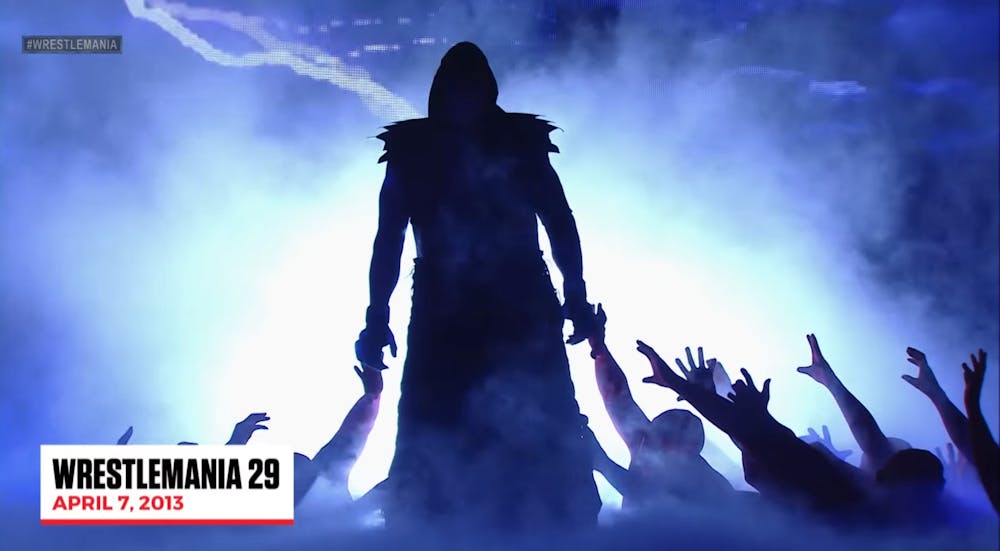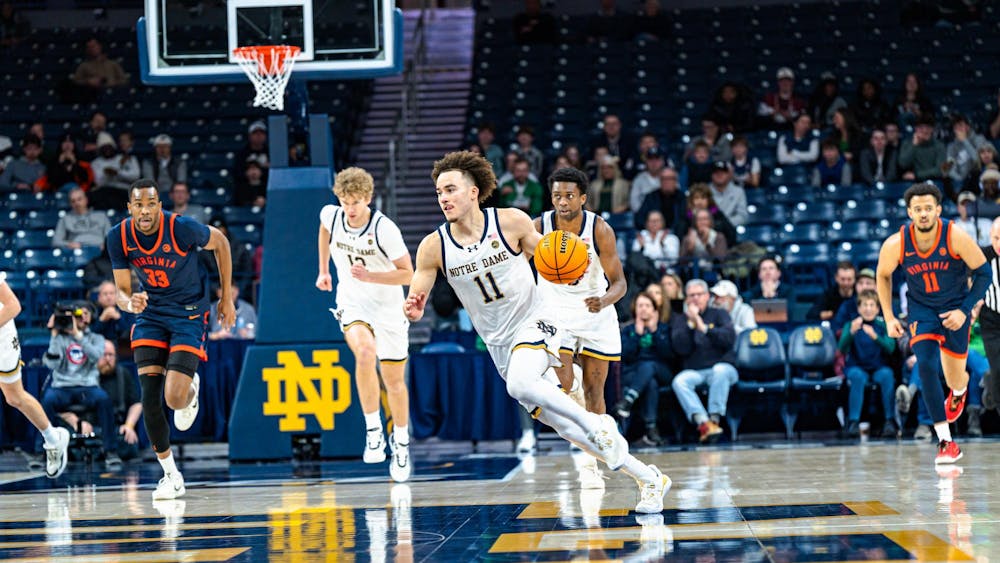At first, you don’t see his shadow. You hear him.
A church bell tolls. A choir starts singing. Lightning strikes and thunder claps. Then, you hear a funeral march. The arena goes dark and the wind picks up, and suddenly, a figure emerges from the purple fog. The whites of his eyes glint in the darkness. It feels supernatural, like the end of times, like you’re about to meet your maker.
Mark “The Undertaker” Calaway’s iconic World Wrestling Entertainment (WWE) entrances are scary enough to strike fear into the hearts of anyone, even the burliest wrestlers in the league. The Undertaker was an intimidating opponent, coming in at 6’10” and 309 lbs with a nearly 75% win rate. He was one of the longest-tenured wrestlers in the WWE and was inducted into the WWE Hall of Fame shortly after his retirement. He is also a large part of why the WWE’s annual Wrestlemania event — the fortieth of which took place last weekend — is so popular today, serving as a major draw for wrestling fans both due to his (once-undefeated) streak of 21 straight victories and truly unbeatable “Deadman” gimmick.
You can only imagine his effect on 9-year-old me and my 7-year-old brother. He’s a legend in households across the country — but especially mine. He dominated the flatscreen TV in our living room during wrestling season, becoming a looming presence that haunted our childhood. Our dad would often evoke his image (like an evil Santa Claus) to get my brother and I to behave, rolling his eyes to the back of his head, wiggling his fingers and mumbling something spooky about The Undertaker under his breath.
Often, in the half-light of the television, my brother and I would wrestle each other — but (get this) these matches were sanctioned by our parents. They figured if we were going to fight anyway, why not make a production out of it? Free entertainment! Besides, we needed an outlet for all the pent-up aggression, a place to set straight all the petty injustices of the week. That place just so happened to be an air mattress and couch we turned into a make-shift wrestling ring.
As hilarious as our parents probably found it, the stakes of these matches were incredibly high. Under the shadow of The Undertaker, we would crouch and slowly circle each other with our steps sinking into the slowly deflating mattress. We would squint at each other and try to size one another up. Exactly how angry did I make you this week? Where are your bruises from the playground? Our tiny house in Texas became a saloon in the Old West. You could practically hear the guitar and the whistling, practically see the tumbleweeds roll by.
Then, the slightest movement would launch eight scrawny and unwieldy limbs into a frenzy. I did not (and still don’t) know any of the rules or grabs or holds that dictate a wrestling match and I could never do a Tombstone Piledriver on my brother, though I might have been delusional enough to try to attempt it at one point. We would simply attack each other. No strategy. No hesitation. No fear.
Often, I would win with my secret weapon. My brother’s undefended stomach, soft and ticklish, was his downfall every time. Underneath my fingers, he would melt into a puddle of laughter. Just like the athletes in a WWE match, we would never seriously hurt each other. It was all part of a performance.
Sometimes, I long for those days when my brother and I brawled freely, when my biggest fear was a man in his mid-forties, wearing a black spandex unitard, playing pretend on national television. Because at the time, we did not yet know the very real shadow of death loomed over our family.
Our mother died nearly four months before The Undertaker won his last match of “The Streak.” That’s when we all learned what real fear was. The Undertaker’s signature purple was nothing compared to flashing red and blue police lights. The whites of his eyes were nothing compared to how stark our tile floor looked the morning our father told us she had passed. “The Deadman” looked less serious next to death.
The loss hardened my brother and father. As I watched my brother grow up, the softness in his belly got firmer, his smile faded and his wonderful bouts of laughter got fewer and farther in between. My dad would watch WWE matches alone, kicked back in his dark bedroom with a Bud Light Lime, instead of in the living room.
Despite everything, we clung onto each other. It would — and still does — take a lot of force to knock down the walls we built around us, but we work at it every day. As we’ve grown older, my brother and I have learned to reconcile our differences without getting physical. And still, we accidentally fall into old habits. It may seem, on the surface, like aggression when I shadow-box my brother or when he puts me into a headlock. But I guess fighting, too, can be a form of intimacy.
We didn’t know it then, but our father was teaching us a valuable lesson, one we were far too young to understand. During those Saturday nights under the shadow of The Undertaker, under the man I once believed to be death itself, wrestling my brother became an excuse to hold onto him tighter — and somehow, miraculously, we forgot we were afraid.










